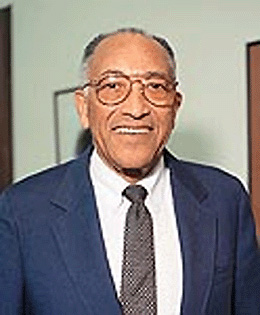Charles Z. Smith was the first African American and the first person of color to serve on the Washington State Supreme Court. He was appointed by Governor Booth Gardner (1936-2013) in 1988, and was thereafter elected unopposed three times. He retired from the court in 2002.
Early Years
Justice Smith was born in Lakeland, Florida, in 1927, of a Cuban father and an African American mother. His parents divorced when he was 12, so he moved in with another family, which relocated to Philadelphia.
He entered Temple University and earned a bachelor's degree in science in 1952, never intending to go to law school. He had actually wanted to be a psychiatrist, but when he had an opportunity to observe surgery, the sight of blood was too much for him. He thought about social work, but was encouraged to consider law school instead.
His mother was living in Seattle so he applied to the University of Washington School of Law and was accepted in 1952. Out of a class of 120, he was one of four students of color and the only one to graduate in 1955.
Law Career
Justice Smith had a distinguished and varied legal career from law clerk to judge, and as a radio commentator and university professor. His first job after graduation was as law clerk for Washington Supreme Court Justice Matthew W. Hill. From 1956 until 1960, he was a deputy prosecuting attorney for King County. For the next four years he was a special assistant to United States Attorney General Robert F. Kennedy.
He served as a judge of the Seattle Municipal Court from 1965 until 1966, and as a judge of the King County Superior Court from 1966 until 1973. He was associate dean and professor of law at the University of Washington, retiring in 1983 as professor emeritus. From 1973 until 1979 he was a news commentator for KOMO Radio and Television. Smith was also a principal in a private law firm.
In 1986, he retired from the United States Marine Corps Reserve with the rank of Lieutenant Colonel. He had prior service in the United States Army from 1945 to 1946.
Community Service
Smith served in local, national, and international organizations concerned with religion, law, health, children and families, human rights, and cultural diversity. In 1999, President Bill Clinton appointed him to the U.S. Commission on International Religious Freedom, where he played several key roles and made international impact. He helped to develop policies to end the civil war in Sudan and combated persecution of religious minorities in countries such as China, Egypt, India, Indonesia, Iran, and Pakistan.
From 1987 to 1990, Justice Smith served as chairperson of the Washington State Supreme Court's Minority and Justice Task Force, and at that time he created a National Consortium to generate awareness and address issues of racial and ethnic fairness in state courts. He served as moderator of the National Consortium on Racial and Ethnic Fairness in the Courts for 10 years. He served as president of the American Baptist Churches, USA, and spent many years working on behalf of immigrants' rights. He chaired the American Bar Association Task Force on Minorities in the Judiciary, Judicial Division, until 1997.
He also chaired the Community Council at the Washington State Reformatory and served on the King County Jail/Correctional Facilities Advisory Committee. He served as chairperson of the Seattle Mayor's Panel on Disparate Employee Discipline. He was a member of the Criminal Justice Standards and the Juvenile Justice committees of the American Bar Association.
Awards
Charles Z. Smith received many awards over the course of his career. These include:
- 1988 Lawyer of the Year Award, Seattle King County Bar Association
- Public Service Award, United States Department of Justice Community Relations
- 1989 Alpha Phi Alpha Distinguished Service Award
- 1990 Edwin T. Pratt Award, Seattle Urban league
- Distinguished Alumnus Award, University of Washington School of Law
- 1994 Kappa Alpha Psi Distinguished Judicial Service Award
- 1995 African American Legislative Committee Distinguished Service Award
- 1996 Silver Gavel Award, Washington State Hispanic Bar Association
- Hispanic Judge of the Year Award, Hispanic National Bar Association
- 1997 Outstanding Judge Award, King County, Washington Bar Association
- 1999 Don Kazama Human Relations Award, Japanese American Citizens League, Seattle Chapter
- 2001 Lifetime Service Award, Washington State Bar Association
- 2004 Distinguished Service Award, National Center for State Courts
Charles Z. Smith died in August 2016 at the age of 89.

